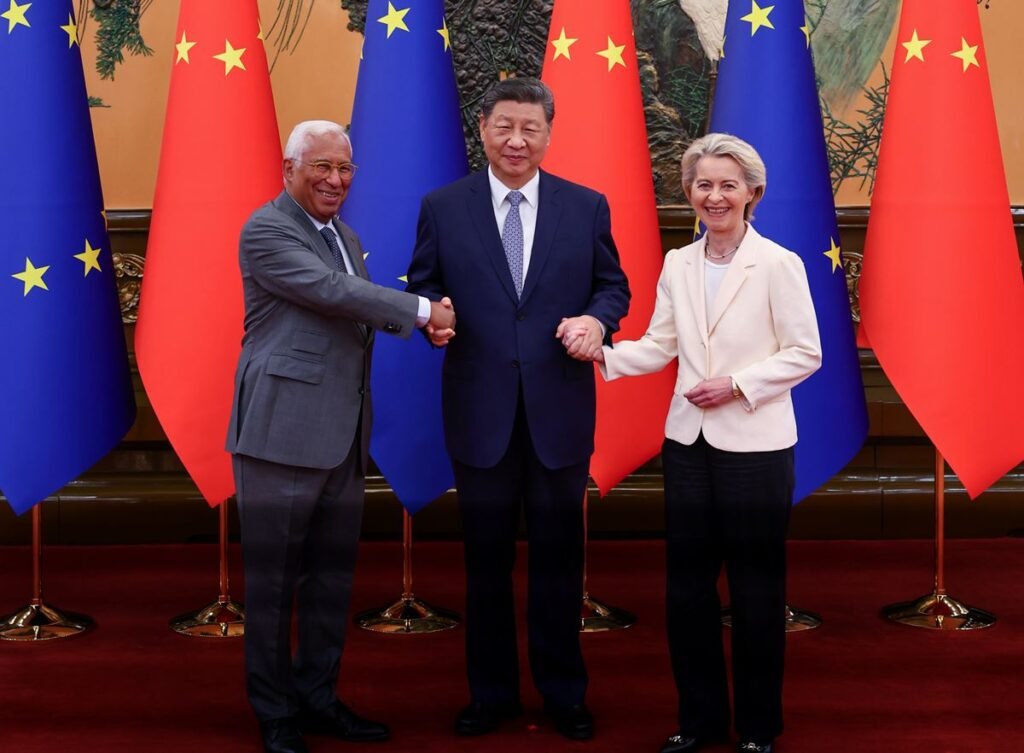The EU warned China at a summit in Beijing against providing material support to sustain Russia’s military-industrial base, and that there need to be more balance in EU-China trade.

At the summit, EU leaders stressed that deepened engagement must lead to concrete progress on key issues including China not providing material support for Russia’s war of aggression against Ukraine. The EU underscored that the Democratic People’s Republic of Korea’s supply of troops and arms in support to Russia’s war in Ukraine poses considerable risks to security in Europe as well as East Asia.
The EU also highlighted the fact that current trade relations remain ‘critically unbalanced’, with the trade deficit in goods reaching €305 billion. It raised concerns about ongoing systemic distortions and growing manufacturing overcapacity, both of which exacerbate an uneven playing field. The EU reiterated its call for progress on longstanding market access issues and recalled that Chinese investments in Europe contribute to the EU’s long-term competitiveness, technological progress and quality job creation.
The EU expressed its expectation that China takes concrete action on EU firms’ access to China’s market in priority areas such as meat, cosmetics and pharmaceuticals. The EU insisted on the need for China to put an end to unjustified and retaliatory trade defence cases and measures on EU exports of brandy, pork and dairy. The EU highlighted the negative impact of export controls on rare earths and permanent magnets introduced by China and urged China to lift these restrictions.
Leaders welcomed the positive and productive bilateral cooperation on climate change, built on close engagement both bilaterally and in international fora. They agreed that the EU and China must lead global efforts to reduce greenhouse gas emissions including at COP30. Underlining this commitment, the two sides agreed a Joint Press Statement on Climate Change. The EU’s share of global emissions has dropped to 6% and the EU reaffirmed its determination to reduce it even further, to 4%, by 2030. The EU encouraged China to propose an ambitious plan for its emission reductions up to 2035, and to step up its international finance contributions, commensurate with its size and global responsibility.
The EU stressed the need to foster reciprocity in the digital sphere, underlining that European companies faced limited access to China. The EU further reiterated continued concern about the lack of clarity regarding Chinese data security rules and cross-border data flows from China, as well as malicious cyber activities detected as originating from China.
The EU reiterated its deep concerns about the human rights situation in Xinjiang and Tibet, the treatment of human rights defenders and persons belonging to minorities, as well as the continued erosion of fundamental freedoms in Hong Kong, where China should honour its prior commitments. The EU welcomed the holding of the 40th session of the EU-China Human Rights Dialogue on 13 June 2025 in Brussels, which allowed for an in-depth exchange on human rights issues, including on a number of individual cases of concern.
The EU reaffirmed its consistent One China policy and expressed concerns about increased tensions in the Taiwan Strait. Heightened instability in the East and South China Seas threatens regional and global prosperity and security. The EU opposes any unilateral attempts to change the status quo by force or coercion and insists on resolving disputes through peaceful means in accordance with international law, in particular the United Nations Convention on the Law of the Sea (UNCLOS).